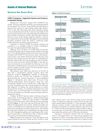TLDR Women are more likely to have long-term post-COVID symptoms than men.
This multicenter cohort study involving 1,969 individuals found that while there were no significant sex differences in initial COVID-19 symptoms, females were more likely to experience long-term post-COVID symptoms, including fatigue, dyspnea, pain, hair loss, ocular problems, depressive levels, and poor sleep quality. Specifically, females had a higher likelihood of reporting ≥3 post-COVID symptoms (adjusted OR 2.54) and hair loss (adjusted OR 4.529). The study underscores the need for healthcare systems to consider sex differences in managing long-term post-COVID conditions.
 1250 citations
,
August 2021 in “Scientific Reports”
1250 citations
,
August 2021 in “Scientific Reports” COVID-19 leaves 80% of patients with long-term symptoms like fatigue and headaches.
 213 citations
,
December 2020 in “Annals of internal medicine”
213 citations
,
December 2020 in “Annals of internal medicine” Many COVID-19 patients still have symptoms like fatigue and loss of taste or smell a month after diagnosis.
 78 citations
,
June 2022 in “Infection”
78 citations
,
June 2022 in “Infection” Many COVID-19 survivors experience long-term symptoms like fatigue and sleep issues, needing ongoing medical support.
 1250 citations
,
August 2021 in “Scientific Reports”
1250 citations
,
August 2021 in “Scientific Reports” COVID-19 leaves 80% of patients with long-term symptoms like fatigue and headaches.
 151 citations
,
May 2021 in “Frontiers in Medicine”
151 citations
,
May 2021 in “Frontiers in Medicine” Many patients experience long-lasting symptoms like fatigue and pain after COVID-19, regardless of initial disease severity.
 1 citations
,
May 2023 in “Scientific Reports”
1 citations
,
May 2023 in “Scientific Reports” Most hospitalized COVID-19 survivors in the study experienced long-term symptoms, affecting their daily life and mental functions.
 3 citations
,
April 2023 in “Clinical and Experimental Medicine”
3 citations
,
April 2023 in “Clinical and Experimental Medicine” The study identified five types of long COVID symptoms and suggests tailored management strategies for each.
 April 2024 in “Cell death and disease”
April 2024 in “Cell death and disease” Long COVID causes various long-term health issues and needs better awareness and treatment.






